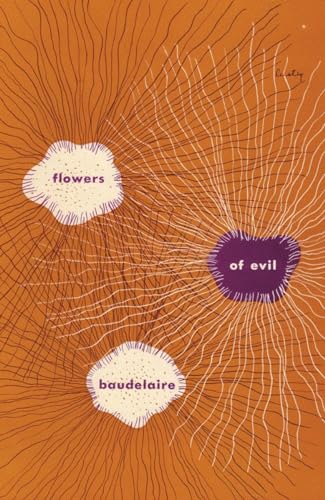The Flowers of Evil (New Directions Paperbook)
Charles Baudelaire
BOOK REVIEW

The Flowers of Evil is not just a collection of poems; it's a breathtaking plunge into the abyss of beauty, darkness, and the rawness of human emotion. This extraordinary work by Charles Baudelaire is a vivid testament to how literary art can illuminate the grotesque and sublime contours of life, capturing the hearts of readers for over a century.
Through its pages, you encounter a world where lush gardens intertwine with the fetid decay of urban existence. The poems resonate with an eerie familiarity, as if they're dredging up the very essence of your innermost thoughts and feelings. Baudelaire doesn't merely write; he conjures experiences that make you feel alive yet haunted. 🌹
The backdrop against which The Flowers of Evil unfolds is as crucial as the poems themselves. Written during a tumultuous period in 19th-century France, Baudelaire's work emerges from the shadows of the Industrial Revolution, where the filth and opulence of Paris coalesce into a vivid tapestry. It's no wonder critics have hailed this collection as one of the first modernist texts, pushing the boundaries of poetic structure and subject matter. Baudelaire dared to explore areas society deemed taboo, peeling back the layers of hypocrisy that veiled human desire and despair.
The themes of beauty and decay intertwine seamlessly in Baudelaire's verses, creating a dance of exquisite tension that will leave you breathless. He challenges you to accept the dualities that exist within us all-the angelic and the demonic, love and hate, joy and suffering. When you read poems like "Correspondences" with its haunting synesthetic imagery, you can't help but feel flooded by both longing and introspection.
Interestingly, when readers share their thoughts on The Flowers of Evil, opinions often polarize. Some describe it as a masterclass in understanding the complexity of human emotion, while others find Baudelaire's tone overly dark and oppressive. Critics can't ignore the sheer brilliance of his poetic craftsmanship, but they often grapple with the question: is beauty worth the price of despair? For many, the answer lies in the exploration itself-the chaos encapsulated in the act of creation, as Baudelaire himself might argue.
It's mesmerizing how Baudelaire's legacy stretches far beyond his own pen. Think of literary titans like T.S. Eliot and James Joyce-both were undeniably influenced by this French poet's fearless exploration of modern life. His works paved the way for symbols flying high in literary contexts, leading to a renaissance of expression in the United States and around the globe. Can you fathom the impact he had on those writers? It's staggering. 📖
The emotional resonance of The Flowers of Evil is inescapable. It forces you to confront your own shadows while simultaneously illuminating moments of beauty that linger in the dark corners of your heart. There's a sense of camaraderie in his words; as you read, you realize that you are not alone in your suffering. Baudelaire is a kindred spirit, one who embraces the darkness with open arms, suggesting that perhaps it's within that darkness that true beauty resides.
Dare to traverse these pages. Allow Baudelaire to guide you through the streets of despair, the gardens of hope, and into the depths of your own soul. The haunting melodies of his verses beckon you not just to read, but to feel deeply-perhaps to reflect on your desires, your fears, and ultimately, your humanity. 🖤
In the end, The Flowers of Evil is a portal to a world where emotion reigns supreme. It's an experience you won't forget-much like love and loss. You'll want to share these thoughts and feelings with others, creating a ripple effect that propels this literary gem into contemporary discussions. So dive in, indulge yourself, and embrace the chaos that lies within; it just might change how you view the world forever.
📖 The Flowers of Evil (New Directions Paperbook)
✍ by Charles Baudelaire
🧾 448 pages
1989
#flowers #evil #new #directions #paperbook #charles #baudelaire #CharlesBaudelaire